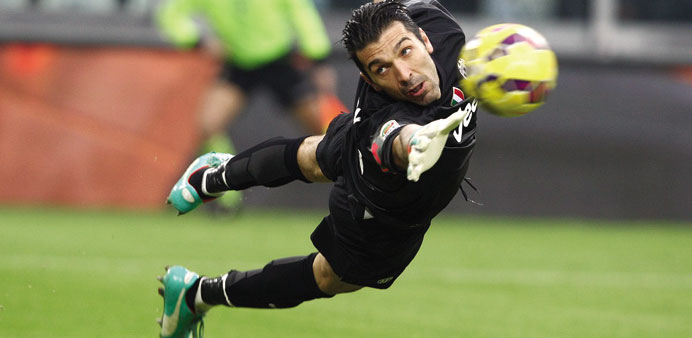The largest fee ever paid for a goalkeeper remains the £32.6mn Juventus paid Parma for Gianluigi Buffon in 2001 – a deal that seemed extraordinary at the time but one that, in retrospect, looks incredibly good value.
By Jonathan Wilson/The Guardian
So far, this has been the transfer window of the goalkeeper. Petr Cech has already joined Arsenal and David de Gea, Hugo Lloris and Iker Casillas are all possibly on the move, each in turn provoking their own search for replacements.
The slight surprise is that it hasn’t happened before: after all, very few clubs have more than one top-class keeper – the dilemma Chelsea faced last season, replacing Cech with Thibaut Courtois, is so rare that the closest precedent is perhaps Leicester City in 1967 deciding they could sell Gordon Banks and replace him with the 18-year-old Peter Shilton – so when one moves it should provoke a chain reaction.
Perhaps the truth is simply that goalkeepers have never been particularly appreciated. Lev Yashin remains the only goalkeeper ever to have won the Ballon d’Or. In England, Shilton is the only goalkeeper ever to have been named the PFA Player of the Year and Neville Southall and Bert Trautmann the only goalkeepers ever to have won the FWA award (there is an abiding oddity that an individual award in a team sport should have paid so little attention to the most individualistic position).
The largest fee ever paid for a goalkeeper remains the £32.6m Juventus paid Parma for Gianluigi Buffon in 2001 – a deal that seemed extraordinary at the time but one that, in retrospect, looks incredibly good value. Buffon is the only goalkeeper to feature in the list of the 100 most expensive transfers of all time. In a post-Moneyball world in which clubs are increasingly obsessed by seeking a competitive advantage through smart spending, the goalkeeper seems an under-exploited seam.
The lot of the goalkeeper has perhaps always been to be overlooked. When Brian Clough signed Shilton for Nottingham Forest from Stoke City in 1977 for £270,000, he faced opposition from his board (even though Stoke had paid £325,000 three years earlier).
Given Stoke had been relegated, one director supposedly asked Clough, was he really that good? And was it really wise to pay so much for a player who wouldn’t be involved for 85 minutes of every game?
Clough always had a ready store of directors to act as straw men but in this case, whether his claim was based on an actual conversation or not, the quibble represented – perhaps still represents – a general feeling: if you can get the rest of the team right, your goalkeeper shouldn’t be that involved.
As Clough pointed out, though, a save is worth as much as a goal. With John Middleton in goal Forest had conceded six goals in their first five games of that 1977-78 season; it took Shilton a further 14 games to let in six and, Clough always said it was largely thanks to him that Forest went on to win the title. “With Shilton in goal,” Clough told Duncan Hamilton, “it gave everyone more confidence. It spread through the side … The defenders felt safer, and the forwards thought if we could nick a goal, there was more than an evens chance that the opposition wouldn’t score at the other end.”
The psychological side is only one of the unseen factors. Shilton was such a good organiser of his defence that he claimed in The Magnificent Obsession (the 1982 book he wrote with Jason Tomas, which is much more about the art of goalkeeping than his 2004 autobiography, an extraordinary act of character self-assassination) that many of his best games had come when he had barely touched the ball: he stopped the shot before a forward had even taken it.
That’s the paradox of goalkeeping: it tends to look good only when something has gone wrong (for more on this theme, see my book The Outsider) and for that reason, at its best, it is rarely eye-catching, which reinforces the myth that goalkeeper is an area in which a club can economise.
The lack of a truly top-class goalkeeper perhaps isn’t the only reason Arsenal haven’t mounted a realistic title challenge in a decade, but it’s certainly been a major factor. David Ospina, who had a superb Copa América, perhaps was a step towards that, but Cech is a further upgrade for his organisational capacity as much as anything more overt. It’s not as simple, though, as simply buying the best goalkeeper; no less than any other position, the goalkeeper has to fit the tactical make-up of the rest of the side. For Louis van Gaal more than most, there is a clear template his goalkeeper has to fit – something that comes across with brutal clarity in Ronnie Reng’s biography of Robert Enke.
For Van Gaal, as for so many of the Dutch school, the goalkeeper has to be able to leave his box and play as a sweeper, which is why Enke didn’t fit at his Barcelona, and why the two goalkeepers with whom United have been most strongly linked should De Gea leave are Lloris and Jasper Cillessen, both of whom are comfortable with the ball at their feet.
As, of course, is Víctor Valdés – if United really are in pursuit of Lloris and Cillessen, the only conclusion can be that they are not fully convinced of his recovery from a knee injury.
But the truly significant aspect of this summer so far is how much talk there has been about goalkeepers. 103 years after they were given a different coloured shirt to wear, at last, perhaps, their full value is beginning to be recognised.

